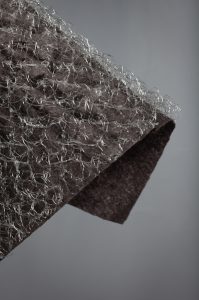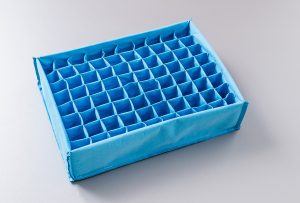WEINHEIM, Germany — March 14, 2024 — Freudenberg Performance Materials (Freudenberg) is showcasing pioneering and sustainable solutions for the automotive, building, apparel, filtration and packaging industries at Stand C29, Hall 12.2 of this year’s Techtextil in Frankfurt am Main April 23-26. The materials developed by Freudenberg’s experienced specialists score in terms of recycling and circularity.
Sustainable nonwoven for car seats
As one of the world’s leading manufacturers of technical textiles, innovative solutions from Freudenberg help the automotive industry become more sustainable. One innovation highlight at Techtextil is a novel Polyester nonwoven material for car seat padding. Also available as a nonwoven composite with PU foam, it is not only easier for car seat manufacturers to handle during the mounting process, but also ensures better dimensional stability as well as providing soft and flexible padding. The material is single origin and has low volatile organic compounds (VOC), ensuring a lower environmental impact. It also has a minimum 25 percent recycled content, for example, by reusing nonwoven clippings and waste, and is fully recyclable. Full supply chain transparency enables customers to easily trace and verify the content of the nonwoven and thus ensures a responsible production process. The Freudenberg experts will also be presenting several other nonwoven solutions made of up to 80 percent recycled materials that can be used in car seat manufacturing.
Biocarrier for green roofs

Source: ©Freudenberg Performance Materials
As part of its commitment to sustainable building concepts, Freudenberg is showcasing a sustainable carrier material for green roofs on urban buildings at the trade fair. The carrier is made from polylactide, i.e. from renewable resources. When filled with soil, it provides a strong foothold to root systems, enabling the growth of lightweight sedum blankets that can be rolled out to provide instant green roofs. These roofs not only help counter urban heat, they also improve stormwater management and regulate indoor temperatures.
From textile waste to padding
Freudenberg continues to promote the circular economy in the textile industry with several new solutions. For example, the company extended its circular thermal wadding product range with the release of comfortemp® HO 80xR circular, a wadding made from 70 percent recycled polyamide from discarded fishing nets, carpet flooring and industrial plastic. Because polyamide 6, also known as nylon, retains its performance characteristics after multiple recycling processes, the fibers can be used again and again to manufacture performance sporting apparel, leisurewear and luxury garments. Just recently, Freudenberg contributed another innovative thermal insulation to the first parka made from 100 percent recycled used clothing. This was made possible by loopamid®, a new nylon fiber developed by BASF that simplifies textile-to-textile recycling for nylon garments.
Packaging solutions with various sustainability benefits

Source: ©Freudenberg Performance Materials
Freudenberg is also showcasing pioneering products for sustainable packaging and filtration solutions. The long-lasting Evolon® technical packaging series is a substitute for disposable packaging used in the transport of sensitive industrial items such as automotive parts. The material is made from up to 85 percent recycled PET. A further highlight at Techtextil are Freudenberg’s fully bio-based solutions for manufacturing dessicant bags. The binder-free material based on bio-fibers is also industrially compostable.
In addition, the experts will be giving trade fair visitors an insight into Freudenberg’s Filtura® portfolio. The innovative Air Pollution Control (APC) filtration bags made from hydroentangled microfilament material for industrial filtration are not only lightweight, but also offer customers a high filtration performance and trouble-free filter cleaning.
CO2-neutral trade fair stand
As at the last Techtextil, Freudenberg’s presence at this year’s trade fair will be CO2-neutral. The CO2 emissions of materials and activities at the trade fair will be calculated and then offset by planting trees.
Posted: March 14, 2024 – amended March 18, 2024
Source: Freudenberg Performance Materials




